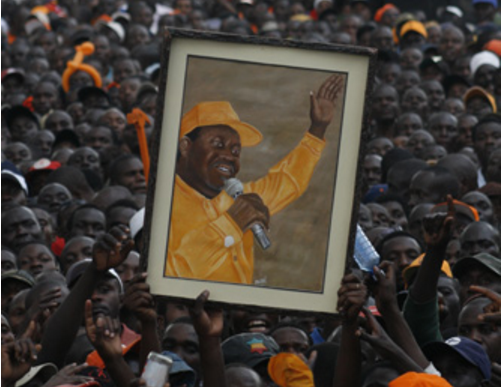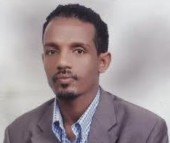The Perils Facing Kenya’s Freedom of Speech and Peaceful Protests
by Chalachew Tadesse / June 24, 2016 / No comments

Orange Democratic Movement supporters hold up a portrait of Raila Odinga. Image via WikiCommons.
In Kenya, increasing political and tribal tension is hurting the country’s democracy and freedom of expression.
Violent clashes between Kenyans and security forces have again resurfaced in the tribally-divided East African country. Led by the main opposition party, the Coalition for Reform and Democracy (CORD), protesters have been holding weekly demonstrations for more than a month demanding the reform of the election oversight body, the Independent Electoral and Boundary Commission (IEBC).

- This column’s topics will include literature, art, education, history, and political culture in Ethiopia, as well as society and politics in the Horn of Africa. Moreover, I will address the tribulations of journalists and the ill-fated constitutional right of freedom of expression under Ethiopia’s deceptive authoritarian regime. I will try to be the voice of the voiceless, be it persecuted journalists at home or exiled journalists abroad. These themes will make Ethiopia’s uniqueness and absurdities evident.

- Chalachew Tadesse is an Ethiopian journalist and columnist. He has previously worked as a full time journalist for The Reporter and The Sub-Saharan Informer English newspapers. He was also a columnist for the much-acclaimed Fact magazine, before the Ethiopian regime closed it in October 2014. A political science student by training, he works as a university lecturer and is known for his sociopolitical commentaries on the Ethiopian private press.
Opposition parties accused the IEBC of “corruption, incompetence and vote rigging” during the 2013 presidential elections which were allegedly marred by election rigging and the failure of electronic voting machines. Former Prime Minister Raila Odinga unsuccessfully challenged the results of the election won by the incumbent Uhuru Kenyatta in court accusing the election body of distributing registration machines unequally in all regions. The election body is set to oversee the upcoming August 2017 election, in which incumbent president Uhuru Kenyatta and former Prime Minister Raila Odinga are expected to fiercely compete for the presidency. What angered the government is the opposition’s push to seek reform of the election body outside of the parliamentary framework. However, the opposition seems determined. Two years ago a proposed bill by the opposition failed to pass in the parliament in which the Jubilee government has a clear majority.
Categorically rejecting sustained pressure to resign, the embattled polling body Chief Issack Hassan is adding fuel when he indicated in a recent interview that the country was going down the path of 2007 tribal violence. What angers the opposition more is the rhetoric that he would even bar opposition leaders if they continue to intimidate the commission.
On two major occasions, the protests turned violent when the police shot and killed protesters. Two weeks ago three people were killed by security forces, which recently acquired anti-riot vehicles. Fearing bloody riot in the capital Nairobi, the police were forced to barricade the city’s opposition stronghold slams leading to clashes with peaceful protesters.
Earlier last month, Western ambassadors accused the governing Jubilee coalition government of using excessive force and hence called for dialogue. Frustrated by the deadly protests, Kenya’s Council of Churches and ambassadors of donor countries have since been quick to call for the Jubilee to start dialogue with the opposition unconditionally. Amid these calls the opposition suspended its street protests for one week at the end of May.
Talks between the government and the opposition have failed to diffuse the stalemate leading to the resumption of protests on June 6. Defying prior police warnings protesters took to the streets en mass, which turned out to be another bloody Monday when the police used lethal force and killed two protesters in the western city of Kisumu. Scuffles with the police have continued in several other cities resulting in arrests and injuries. The police still remain unrepentant claiming protesters have attempted to illegally occupy IEBC premises. To the surprise of Kenyans, the violent confrontation came after a High Court ruled in favor of the opposition’s holding of protests. In an attempt to increase pressure, the opposition has vowed to intensify its anti-IEBC protests twice a week, saying it will become daily soon if the government fails to succumb to its demands.
In a country where tribal tensions exist, both sides have hardened political stances and inflammatory rhetoric. The opposition accuses the Jubilee government of pervasive official corruption and stifling freedom of expression. Two years ago the government passed two draconian bills: the 2013 Kenya Information and Communication Act, and the Media Council Act. Those laws allow the establishment of a government-controlled regulatory tribunal (irrespective of the already functioning independent Media Council of Kenya) that will fine journalists up to $5,500 and media houses up to $230,000 or two years behind bars if found guilty of breaching a government-legislated code of conduct including defamation against the parliament.
Big media houses subsequently challenged the laws in court to no avail. In what came to be seen as having a chilling effect on press freedom, a High Court ruled last May in favor of the constitutionality of the bills. In fact, the bills have to be signed by the president to come into effect. Yet the bills pose danger to critical and investigative reporting and self-censorship ahead. For the last several decades, Kenya has been famous for its robust media environment and vibrant independent reporting. Thus, pervasive corruption in the country has often attracted investigative reporters who have exposed the ills of the incumbent coalition government on many occasions. In the last few years however, journalists often complain about state intimidation, extra-judicial killings and impunity.
With this backdrop, many have fears that the longstanding unresolved tension may ultimately cause Kenya to turn towards violence along tribal lines. Memories of the 2007-2008 electoral violence that claimed more than 1,000 lives still haunts Kenyans. Prosecutors of the International Criminal Court filed charges against the president and his deputy William Ruto for their alleged involvement in the violence. Nonetheless, the charges against both have subsequently been dropped for lack of sufficient evidence.
As a key player in the African Union-led mission in Somalia against al Shabaab—a Somali-based terrorist group—Kenya is a crucial partner of the West in the global fight against terrorism. In a recent 2015 revenge attack, al Shabaab massacred nearly 140 Kenyan civilians in northern Kenyan city of Garissa. Frustrated by repeated terrorist attacks, the embattled Jubilee government has recently announced its decision to close the world’s largest refugee camp that has hosted half a million Somali refugees thereby creating international uproar. Without a doubt Kenya’s instability will certainly have far-reaching security implications in the region. That is why Western governments are pushing for early resolution of the impasse between the government and the opposition before the violence gets out of hand.
Now, the question is this: will President Kenyatta give in to opposition demands, which the Jubilee government says are “unconstitutional and unacceptable?” Though this remains to be seen, it is widely believed that the government may give in to certain demands of the opposition on the issue of the polling body to deter rising public anger and eminent political crisis. Freedom of expression may not be spared, however. Even though the opposition is still calling for Kenyatta to scrap the bills, few expect him to heed to the pressure.
Mr. Odinga’s repeated vow that he would win the 2017 election should the IEBC be reformed in a manner that would allow it to conduct free and fair elections is likely to trigger a tribal tension. Mutual mistrust and rivalry characterizes the relationship between the Kikuyu (the president’s tribe which has wielded power since independence) and the Luo tribe of Mr. Raila Odinga. Not only the government. Even the opposition faces a dilemma: Can they afford to continue to hold protests, which are likely to be violent? Uncertainties stand in its way. Continued violence may have backlash should it result in deaths and destruction of property that will frustrate supporters.
Today Kenya’s democracy and freedom of expression is hanging in the balance. Political elites on both sides of the political divide have faced clear choices: to face eminent political crises and violence or take the path of dialogue that could solidify the vibrant media environment and relatively functioning democracy.




